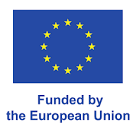Migrant Integration Through Education (MINTE)
Migrant Integration Through Education (MINTE)
Project has been funded with support from the European Commission under the Erasmus+ Programme. Project number: 2022-1-CZ01-KA220-HED- 000087425.
 |
RESEARCH TEAM
- Marie Jelínková, Ph.D. Charles University, the Czech Republic
- Ewa Ślęzak-Belowska, Ph.D. Krakow University of Economics, Poland
- Agnieszka Bielewska. Ph.D. SWPS University of Social Sciences and Humanities, Poland
- prof. Karin Amit, Ruppin Academic Center, Israel
- Sinem Yilmaz, Ph.D. Migration Policy Group, Belgium
Start and duration of the project
ASSOCIATED PARTNERS
THE AIM OF THE PROJECT
The project focuses on the situation of migrants (especially Ukrainians in refugee-like situations) in receiving countries. It aims to facilitate the development of workable integration policies by municipalities in the Czech Republic and Poland and to monitor and learn from good practises related to migrant integration in other European countries and in Israel. In addition, researchers will develop a multimedia course on international migration that will mainly focus on Central Europe. A broader investigation of digital skills among migrants will also be carried out to understand how municipalities (and other actors) could provide information and communicate with migrants in the most efficient way. Research methods will include interviews with migrants and experts. The researchers will also organize meetings with experts to discuss proposed solutions.
MORE ABOUT THE PROJECT
The project has three closely interlinked parts:
- The innovative multimedia course on international migration with a focus on Central Europe (led by: Ewa Ślęzak-Belowska)
The main objective of this part of the project is to educate and familiarize a wide range of actors (practitioners working with migrants, migrants and people with migration background, academics, educators, and all those interested in migration) with the state of the art of international migration in Central and Eastern Europe (CEE) by producing modern, innovative and digitized teaching materials. The main result of this work package is to provide knowledge on international migration in the CEE region to interested parties via an online modular course and related teaching materials.
- Communication with migrants: digital competencies and communication channels (led by Agnieszka Bielewska)
The aim of the second part of the project is to prepare recommendations for authorities and NGOs working with migrants in Central and Eastern Europe and Israel on how to communicate with migrants in the most efficient way. Therefore, we set two main objectives: (a) to gather information on how local and state authorities, NGOs, and other institutions communicate with migrants and how migrants reach information on different aspects of everyday life in a new country; (b) to train the local and state authorities, NGOs, and other institutions as well as the general public on what are the most efficient ways to communicate with migrants.
- Comparison of different models of migrant integration management from a multi-level governance perspective (led by Marie Jelínková)
Given the complexity of integration policies and migrant-related legislation, it isn’t effortless for experts to navigate these models. Therefore, the project provides simplified models of migrants’ integration policies in participating countries. This part of the project also brings together inspiring practices toward migrants from all the countries involved. The selection of these inspiring practices is guided by the desire to capture what works and is largely transferable to other countries, focusing on those measures that contribute to the better participation of migrants (mainly Ukrainians) in our societies.
The last output is a monograph that answers in-depth and from the perspective of CEE countries, Israel, and EU our aforementioned research questions, e.g. What is the role of the different level public officials in the integration process? What challenges are to be tackled when it comes to migrant integration? To what extent and how does the EU influence local integration policies? Last but not least, special attention is also paid to networking and the involvement of local actors in the issues under study.
Reports and Policy briefs from project MINTE
Report 1 On digital skills and competencies with recommendations (Israel) Report 1 (Israel)
Report 1 On digital skills and competencies with recommendations (Poland) Report 1 (Poland)
Report 1 On digital skills and competencies with recommendations (Czech Republic) Report 1 (Czech Republic)
Report 1 Comparative summary report on digital skills and competencies with recommendations Comparative summary
Report 2 On digital spaces of migrants (Israel) Report 2 (Israel)
Report 2 On digital spaces of migrants (Poland) Report 2 (Poland)
Report 2 On digital spaces of migrants (Czech Republic) Report 2 (Czech Republic)
Report 2 Comparative Report on Digital Spaces of Migrants in Poland, CzechRepublic, and Israel Comparative Report
Policy brief EU 1: Promoting Digital Inclusion of Migrants and Refugees in the EU Policy Policy brief EU
Policy brief 1: How authorities inform and how Ukrainian war refugees get informed in Izrael
Policy brief 1: How the Polish authorities inform and how Ukrainian war refugees get informed
Policy breif 2: Digital spaces, skills and competencies of Ukrainian forced migrants in Poland
Policy Brief 2: Digital spaces, skills, and competencies of Ukrainian forced migrants in Israel
Model of migrant integration Israel
Model of migrant integration Poland
Model of migrant integration the Czech Republic

